英语高二下北师大版Unit21《Human Biology》课件3
文档属性
| 名称 | 英语高二下北师大版Unit21《Human Biology》课件3 | 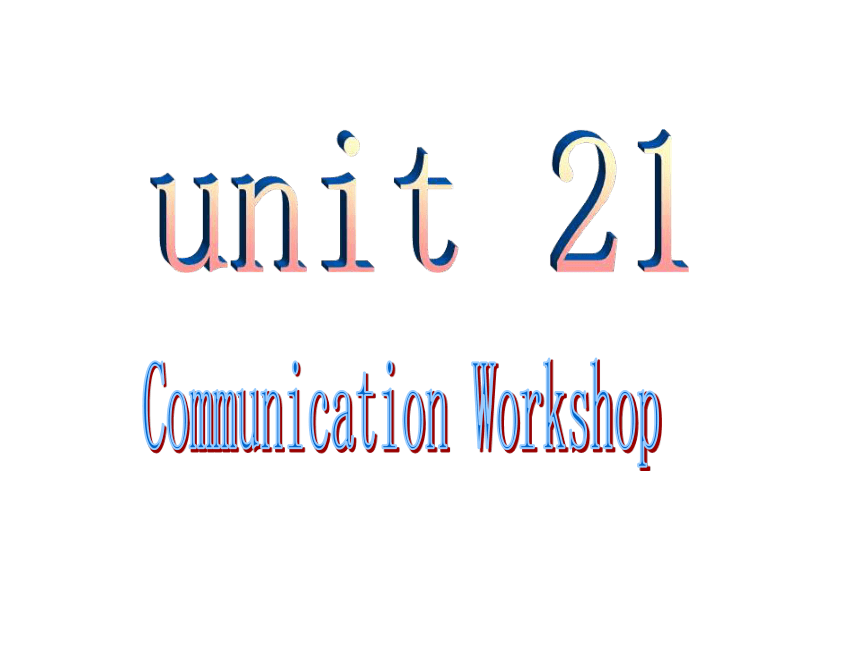 | |
| 格式 | zip | ||
| 文件大小 | 347.8KB | ||
| 资源类型 | 教案 | ||
| 版本资源 | 北师大版 | ||
| 科目 | 英语 | ||
| 更新时间 | 2013-03-11 21:02:00 | ||
图片预览


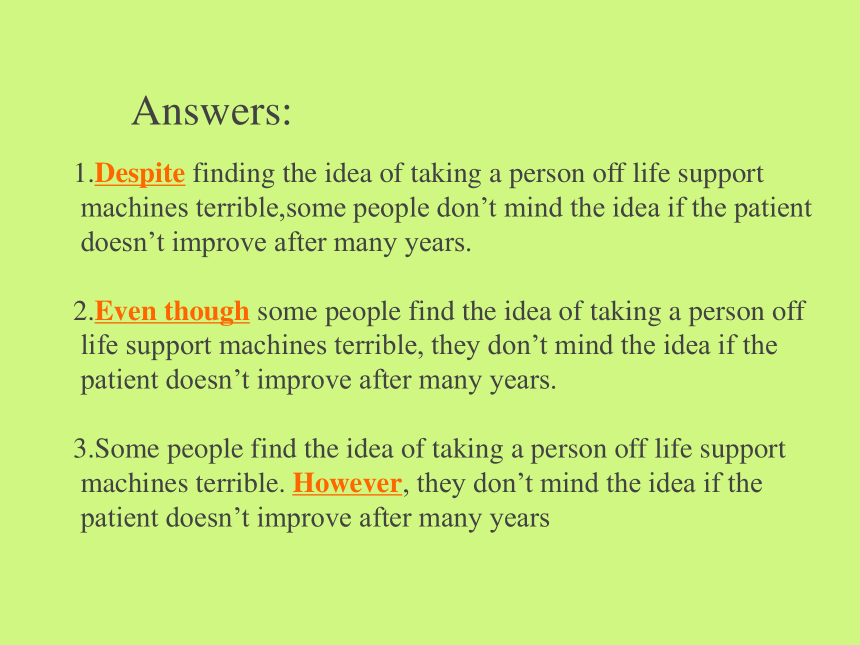
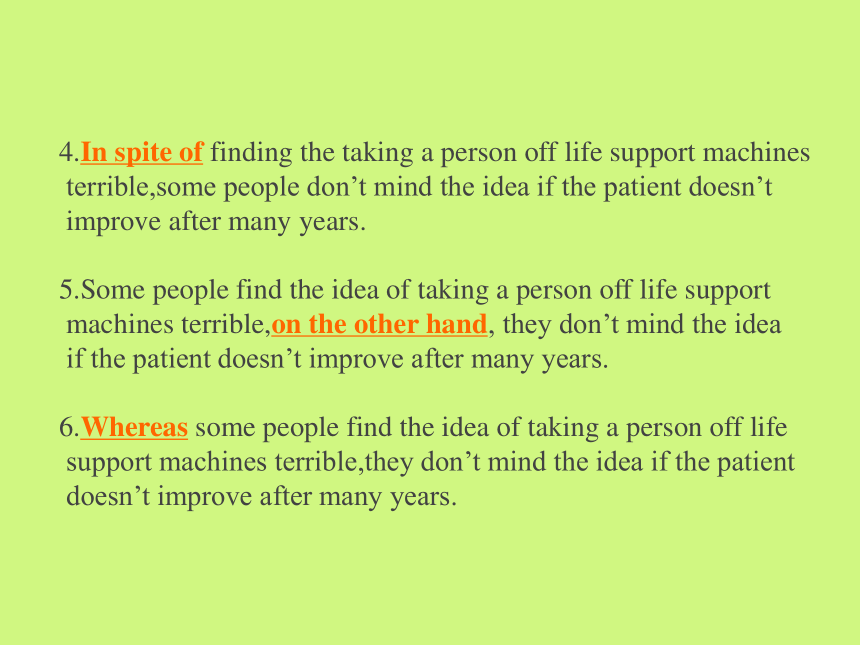
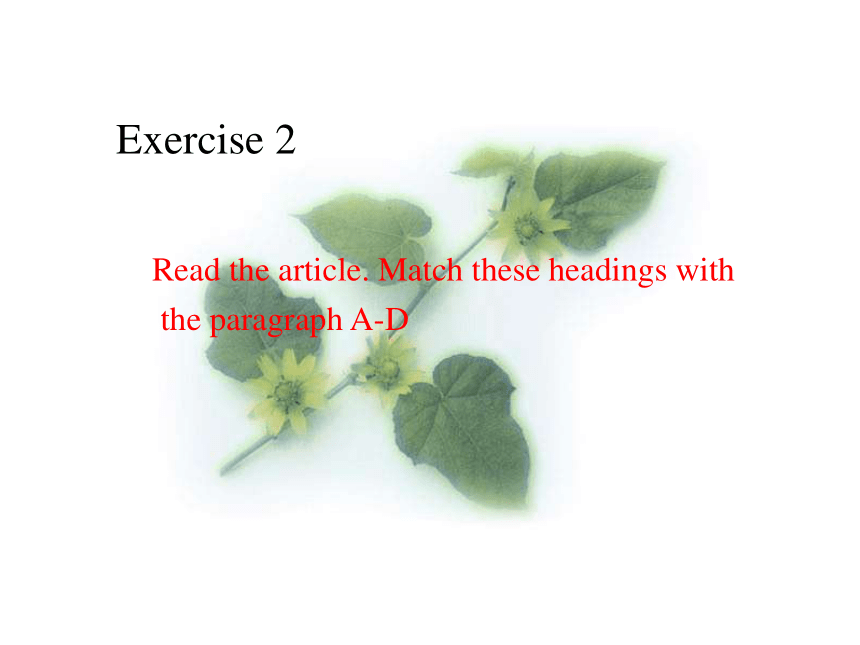
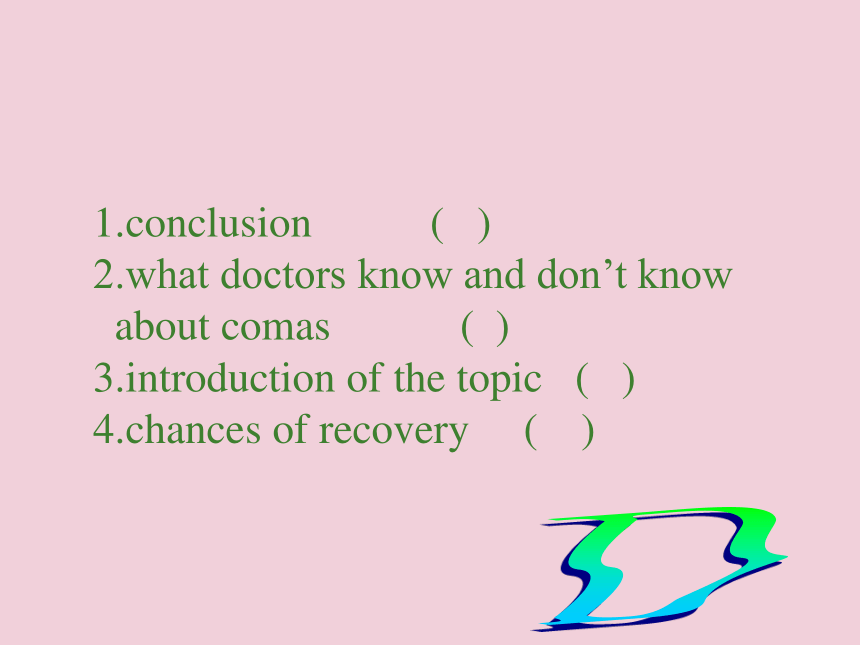
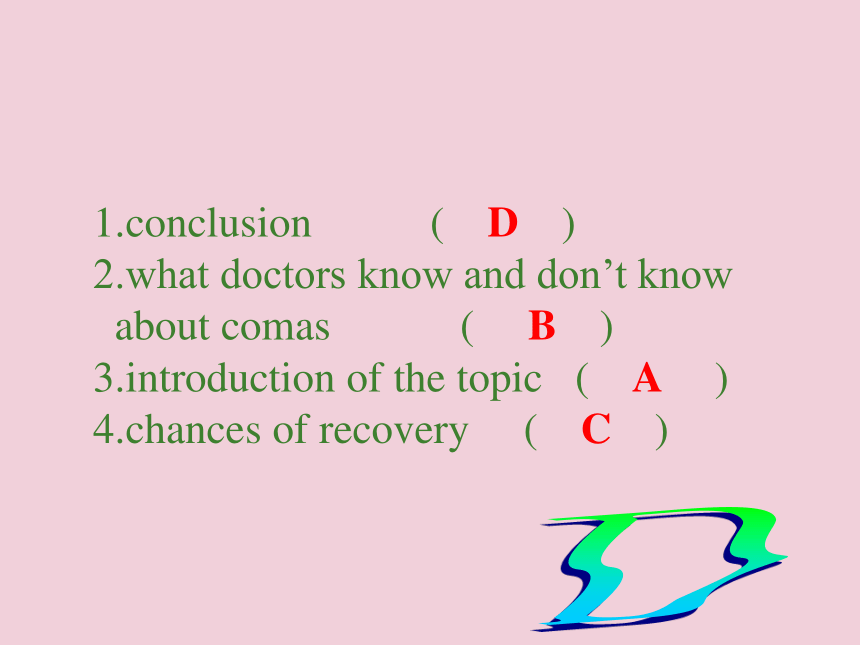

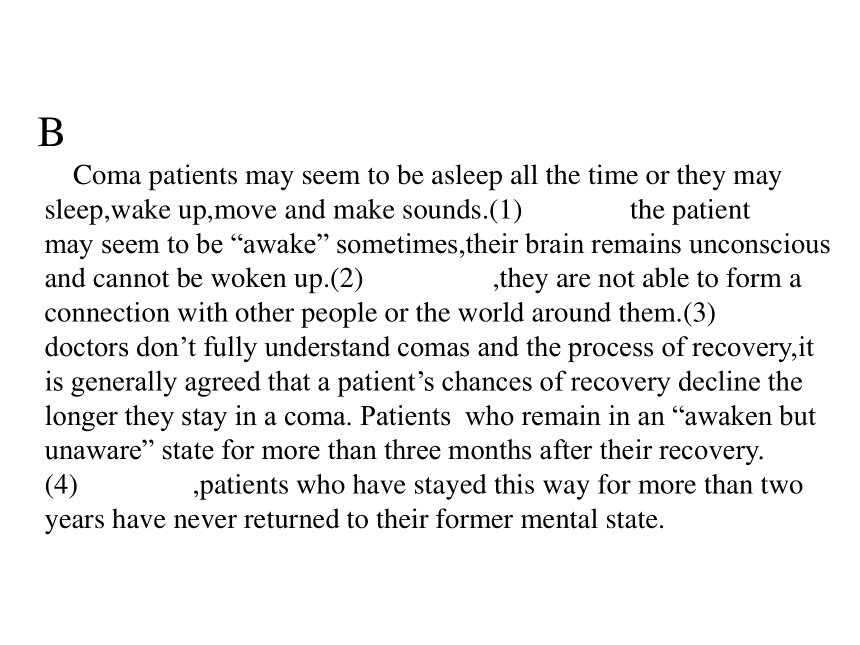
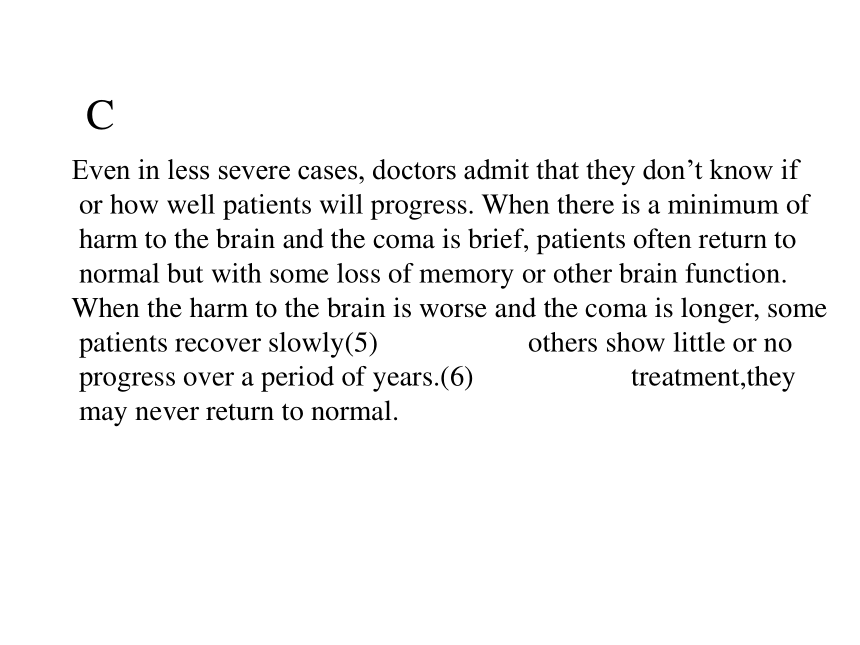


文档简介
课件30张PPT。unit 21Communication WorkshopWritingExercise1 Rewrite the information below
using these words and expressions to join
the two sentences.although,despite,even though,
however,in spite of, on the other
hand,thereforeAnswers:1.Despite finding the idea of taking a person off life support
machines terrible,some people don’t mind the idea if the patient
doesn’t improve after many years.
2.Even though some people find the idea of taking a person off
life support machines terrible, they don’t mind the idea if the
patient doesn’t improve after many years.
3.Some people find the idea of taking a person off life support
machines terrible. However, they don’t mind the idea if the
patient doesn’t improve after many years4.In spite of finding the taking a person off life support machines
terrible,some people don’t mind the idea if the patient doesn’t
improve after many years.
5.Some people find the idea of taking a person off life support
machines terrible,on the other hand, they don’t mind the idea
if the patient doesn’t improve after many years.
6.Whereas some people find the idea of taking a person off life
support machines terrible,they don’t mind the idea if the patient
doesn’t improve after many years.
Exercise 2Read the article. Match these headings with
the paragraph A-D 1.conclusion ( )
2.what doctors know and don’t know
about comas ( )
3.introduction of the topic ( )
4.chances of recovery ( )D1.conclusion ( D )
2.what doctors know and don’t know
about comas ( B )
3.introduction of the topic ( A )
4.chances of recovery ( C )DExercise 3Complete the text with these linking
words and phrases.although,despite, even though
however,furthermore, therefore
whileB
Coma patients may seem to be asleep all the time or they may
sleep,wake up,move and make sounds.(1) the patient
may seem to be “awake” sometimes,their brain remains unconscious
and cannot be woken up.(2) ,they are not able to form a
connection with other people or the world around them.(3)
doctors don’t fully understand comas and the process of recovery,it
is generally agreed that a patient’s chances of recovery decline the
longer they stay in a coma. Patients who remain in an “awaken but
unaware” state for more than three months after their recovery.
(4) ,patients who have stayed this way for more than two
years have never returned to their former mental state.
CEven in less severe cases, doctors admit that they don’t know if
or how well patients will progress. When there is a minimum of
harm to the brain and the coma is brief, patients often return to
normal but with some loss of memory or other brain fun_ction.
When the harm to the brain is worse and the coma is longer, some
patients recover slowly(5) others show little or no
progress over a period of years.(6) treatment,they
may never return to normal.D I agree with the decision of the courts and medical institutions
in the United States, that in the case of long-term coma states,close
family members should be allowed to take their loved one off of
life support machines.(7) ,in all cases, patients should
receive the best treatment possible for as long as there is hope of
recovery before such a decision is considered.Now complete the
sentences with the
correct words from
the brackets.1.(Despite/Because of)taking lots of vitamin C,his cold hasn’t
gone away.
2.(Therefore/Although)my dad rarely gets sick,he goes for a
checkup every year.
3.People don’t like the taste of the medicine.(Even though/
Therefore)we give it to them by needle.
4.I’ve broken bones before,(however/furthermore),this is the
first time I’ve broken my leg.
5.The older patients like to read in bed (while/besides) the
younger ones like to play with toys.
6.You can’t take this medicine with meals or in the morning.
(Although/Furthermore) you mustn’t take it with milk.1.(Despite/Because of)taking lots of vitamin C,his cold hasn’t
gone away.
2.(Therefore/Although)my dad rarely gets sick,he goes for a
checkup every year.
3.People don’t like the taste of the medicine.(Even though/
Therefore)we give it to them by needle.
4.I’ve broken bones before,(however/furthermore),this is the
first time I’ve broken my leg.
5.The older patients like to read in bed (while/besides) the
younger ones like to play with toys.
6.You can’t take this medicine with meals or in the morning.
(Although/Furthermore) you mustn’t take it with milk.ListeningA TV Programme Exercise 1Look at the picture. What kind of programme do you
think it is ? a chat show
a documentary
a panel discussion
a game show√Exercise 2Listen and check your answer to Exercise 1. Then put these
topics in the order they are mentioned.Freezing dead bodiesKnowledge of the human brainLong lifeOrder:
1.knowledge of the human
brain
2.freezing dead bodies
3.long life1.Our knowledge of the human brain will change medicine
.
2.There’s no doubt that it will help up .
3.This is very important because we could .
4.We will be able to cure many common diseases, like certain kinds
of .
5.We can change processes,but .
6.We may be able to freeze certain body parts which .
7.By the year 2020,over 20 percent of the population .
Listen again. Complete each statement from Dr. Cartwright
with a few words.Exercise 3Answers:1.in the next 30 years
2.to cure all sorts of illnesses
3.cure diseases
4.cancer and heart disease
5.we can’t reverse them
6.are in good condition
7.in developed countries will be over eightyPronunciationListen to three sentences. Choose the correct
meaning according to the way each sentence
is stressed.1.The man at the back in the blue jacket.
a)not the woman b)not the front c)not the green jacket
2.There is no doubt that it will help us to cure all sorts of illnesses.
a)not some doubt b)not identify c)not diseases
3)By the year 2020,over 20 percent of the population will be over
eighty.
a)not the year 2010 b)not 30 percent c)not over 90√√√Speaking: A DiscussionExercise 1
Listen to two people discussing genetic engineering.
How would you describe Tom and Jan’s opinions on
the subject:Strongly in favour?Strongly against?In faour but with some concerns?Answers:
Tom strongly against Jan in favour but with reservations√Exercise 2Listen again and match these words with
the colloquial expressions. look at the facts, I disagree, am sure,
not in any circumstances
completely unacceptable or absurd,
from the beginning1.From the word go
2.They don’t care two hoots about
3.I bet you would
4.I wouldn’t touch it with a bargepole
5.It’s totally off the map!
6.Come off it! from the beginning
look at the facts
am sure
not in any circumstances
completely unacceptable or absurd
I disagreeExercise 3 Match the formal expressions from
the TV programme in the Listening Workshop
with the informal expressions from Tom and
Jan’s discussion.1.the first thing I’d like to say is …
2.the important thing is to…
3.I’d like to point out that…
4.there’s no doubt that…
5.in my opinion…
a)we’ve got to…
b)let’s face it…
c)for starters…
d)I think…
e)just look at…HOMEWORKexercise 2 on page 87 Bye-bye课件30张PPT。unit 21Communication WorkshopWritingExercise1 Rewrite the information below
using these words and expressions to join
the two sentences.although,despite,even though,
however,in spite of, on the other
hand,thereforeAnswers:1.Despite finding the idea of taking a person off life support
machines terrible,some people don’t mind the idea if the patient
doesn’t improve after many years.
2.Even though some people find the idea of taking a person off
life support machines terrible, they don’t mind the idea if the
patient doesn’t improve after many years.
3.Some people find the idea of taking a person off life support
machines terrible. However, they don’t mind the idea if the
patient doesn’t improve after many years4.In spite of finding the taking a person off life support machines
terrible,some people don’t mind the idea if the patient doesn’t
improve after many years.
5.Some people find the idea of taking a person off life support
machines terrible,on the other hand, they don’t mind the idea
if the patient doesn’t improve after many years.
6.Whereas some people find the idea of taking a person off life
support machines terrible,they don’t mind the idea if the patient
doesn’t improve after many years.
Exercise 2Read the article. Match these headings with
the paragraph A-D 1.conclusion ( )
2.what doctors know and don’t know
about comas ( )
3.introduction of the topic ( )
4.chances of recovery ( )D1.conclusion ( D )
2.what doctors know and don’t know
about comas ( B )
3.introduction of the topic ( A )
4.chances of recovery ( C )DExercise 3Complete the text with these linking
words and phrases.although,despite, even though
however,furthermore, therefore
whileB
Coma patients may seem to be asleep all the time or they may
sleep,wake up,move and make sounds.(1) the patient
may seem to be “awake” sometimes,their brain remains unconscious
and cannot be woken up.(2) ,they are not able to form a
connection with other people or the world around them.(3)
doctors don’t fully understand comas and the process of recovery,it
is generally agreed that a patient’s chances of recovery decline the
longer they stay in a coma. Patients who remain in an “awaken but
unaware” state for more than three months after their recovery.
(4) ,patients who have stayed this way for more than two
years have never returned to their former mental state.
CEven in less severe cases, doctors admit that they don’t know if
or how well patients will progress. When there is a minimum of
harm to the brain and the coma is brief, patients often return to
normal but with some loss of memory or other brain fun_ction.
When the harm to the brain is worse and the coma is longer, some
patients recover slowly(5) others show little or no
progress over a period of years.(6) treatment,they
may never return to normal.D I agree with the decision of the courts and medical institutions
in the United States, that in the case of long-term coma states,close
family members should be allowed to take their loved one off of
life support machines.(7) ,in all cases, patients should
receive the best treatment possible for as long as there is hope of
recovery before such a decision is considered.Now complete the
sentences with the
correct words from
the brackets.1.(Despite/Because of)taking lots of vitamin C,his cold hasn’t
gone away.
2.(Therefore/Although)my dad rarely gets sick,he goes for a
checkup every year.
3.People don’t like the taste of the medicine.(Even though/
Therefore)we give it to them by needle.
4.I’ve broken bones before,(however/furthermore),this is the
first time I’ve broken my leg.
5.The older patients like to read in bed (while/besides) the
younger ones like to play with toys.
6.You can’t take this medicine with meals or in the morning.
(Although/Furthermore) you mustn’t take it with milk.1.(Despite/Because of)taking lots of vitamin C,his cold hasn’t
gone away.
2.(Therefore/Although)my dad rarely gets sick,he goes for a
checkup every year.
3.People don’t like the taste of the medicine.(Even though/
Therefore)we give it to them by needle.
4.I’ve broken bones before,(however/furthermore),this is the
first time I’ve broken my leg.
5.The older patients like to read in bed (while/besides) the
younger ones like to play with toys.
6.You can’t take this medicine with meals or in the morning.
(Although/Furthermore) you mustn’t take it with milk.ListeningA TV Programme Exercise 1Look at the picture. What kind of programme do you
think it is ? a chat show
a documentary
a panel discussion
a game show√Exercise 2Listen and check your answer to Exercise 1. Then put these
topics in the order they are mentioned.Freezing dead bodiesKnowledge of the human brainLong lifeOrder:
1.knowledge of the human
brain
2.freezing dead bodies
3.long life1.Our knowledge of the human brain will change medicine
.
2.There’s no doubt that it will help up .
3.This is very important because we could .
4.We will be able to cure many common diseases, like certain kinds
of .
5.We can change processes,but .
6.We may be able to freeze certain body parts which .
7.By the year 2020,over 20 percent of the population .
Listen again. Complete each statement from Dr. Cartwright
with a few words.Exercise 3Answers:1.in the next 30 years
2.to cure all sorts of illnesses
3.cure diseases
4.cancer and heart disease
5.we can’t reverse them
6.are in good condition
7.in developed countries will be over eightyPronunciationListen to three sentences. Choose the correct
meaning according to the way each sentence
is stressed.1.The man at the back in the blue jacket.
a)not the woman b)not the front c)not the green jacket
2.There is no doubt that it will help us to cure all sorts of illnesses.
a)not some doubt b)not identify c)not diseases
3)By the year 2020,over 20 percent of the population will be over
eighty.
a)not the year 2010 b)not 30 percent c)not over 90√√√Speaking: A DiscussionExercise 1
Listen to two people discussing genetic engineering.
How would you describe Tom and Jan’s opinions on
the subject:Strongly in favour?Strongly against?In faour but with some concerns?Answers:
Tom strongly against Jan in favour but with reservations√Exercise 2Listen again and match these words with
the colloquial expressions. look at the facts, I disagree, am sure,
not in any circumstances
completely unacceptable or absurd,
from the beginning1.From the word go
2.They don’t care two hoots about
3.I bet you would
4.I wouldn’t touch it with a bargepole
5.It’s totally off the map!
6.Come off it! from the beginning
look at the facts
am sure
not in any circumstances
completely unacceptable or absurd
I disagreeExercise 3 Match the formal expressions from
the TV programme in the Listening Workshop
with the informal expressions from Tom and
Jan’s discussion.1.the first thing I’d like to say is …
2.the important thing is to…
3.I’d like to point out that…
4.there’s no doubt that…
5.in my opinion…
a)we’ve got to…
b)let’s face it…
c)for starters…
d)I think…
e)just look at…HOMEWORKexercise 2 on page 87 Bye-bye
using these words and expressions to join
the two sentences.although,despite,even though,
however,in spite of, on the other
hand,thereforeAnswers:1.Despite finding the idea of taking a person off life support
machines terrible,some people don’t mind the idea if the patient
doesn’t improve after many years.
2.Even though some people find the idea of taking a person off
life support machines terrible, they don’t mind the idea if the
patient doesn’t improve after many years.
3.Some people find the idea of taking a person off life support
machines terrible. However, they don’t mind the idea if the
patient doesn’t improve after many years4.In spite of finding the taking a person off life support machines
terrible,some people don’t mind the idea if the patient doesn’t
improve after many years.
5.Some people find the idea of taking a person off life support
machines terrible,on the other hand, they don’t mind the idea
if the patient doesn’t improve after many years.
6.Whereas some people find the idea of taking a person off life
support machines terrible,they don’t mind the idea if the patient
doesn’t improve after many years.
Exercise 2Read the article. Match these headings with
the paragraph A-D 1.conclusion ( )
2.what doctors know and don’t know
about comas ( )
3.introduction of the topic ( )
4.chances of recovery ( )D1.conclusion ( D )
2.what doctors know and don’t know
about comas ( B )
3.introduction of the topic ( A )
4.chances of recovery ( C )DExercise 3Complete the text with these linking
words and phrases.although,despite, even though
however,furthermore, therefore
whileB
Coma patients may seem to be asleep all the time or they may
sleep,wake up,move and make sounds.(1) the patient
may seem to be “awake” sometimes,their brain remains unconscious
and cannot be woken up.(2) ,they are not able to form a
connection with other people or the world around them.(3)
doctors don’t fully understand comas and the process of recovery,it
is generally agreed that a patient’s chances of recovery decline the
longer they stay in a coma. Patients who remain in an “awaken but
unaware” state for more than three months after their recovery.
(4) ,patients who have stayed this way for more than two
years have never returned to their former mental state.
CEven in less severe cases, doctors admit that they don’t know if
or how well patients will progress. When there is a minimum of
harm to the brain and the coma is brief, patients often return to
normal but with some loss of memory or other brain fun_ction.
When the harm to the brain is worse and the coma is longer, some
patients recover slowly(5) others show little or no
progress over a period of years.(6) treatment,they
may never return to normal.D I agree with the decision of the courts and medical institutions
in the United States, that in the case of long-term coma states,close
family members should be allowed to take their loved one off of
life support machines.(7) ,in all cases, patients should
receive the best treatment possible for as long as there is hope of
recovery before such a decision is considered.Now complete the
sentences with the
correct words from
the brackets.1.(Despite/Because of)taking lots of vitamin C,his cold hasn’t
gone away.
2.(Therefore/Although)my dad rarely gets sick,he goes for a
checkup every year.
3.People don’t like the taste of the medicine.(Even though/
Therefore)we give it to them by needle.
4.I’ve broken bones before,(however/furthermore),this is the
first time I’ve broken my leg.
5.The older patients like to read in bed (while/besides) the
younger ones like to play with toys.
6.You can’t take this medicine with meals or in the morning.
(Although/Furthermore) you mustn’t take it with milk.1.(Despite/Because of)taking lots of vitamin C,his cold hasn’t
gone away.
2.(Therefore/Although)my dad rarely gets sick,he goes for a
checkup every year.
3.People don’t like the taste of the medicine.(Even though/
Therefore)we give it to them by needle.
4.I’ve broken bones before,(however/furthermore),this is the
first time I’ve broken my leg.
5.The older patients like to read in bed (while/besides) the
younger ones like to play with toys.
6.You can’t take this medicine with meals or in the morning.
(Although/Furthermore) you mustn’t take it with milk.ListeningA TV Programme Exercise 1Look at the picture. What kind of programme do you
think it is ? a chat show
a documentary
a panel discussion
a game show√Exercise 2Listen and check your answer to Exercise 1. Then put these
topics in the order they are mentioned.Freezing dead bodiesKnowledge of the human brainLong lifeOrder:
1.knowledge of the human
brain
2.freezing dead bodies
3.long life1.Our knowledge of the human brain will change medicine
.
2.There’s no doubt that it will help up .
3.This is very important because we could .
4.We will be able to cure many common diseases, like certain kinds
of .
5.We can change processes,but .
6.We may be able to freeze certain body parts which .
7.By the year 2020,over 20 percent of the population .
Listen again. Complete each statement from Dr. Cartwright
with a few words.Exercise 3Answers:1.in the next 30 years
2.to cure all sorts of illnesses
3.cure diseases
4.cancer and heart disease
5.we can’t reverse them
6.are in good condition
7.in developed countries will be over eightyPronunciationListen to three sentences. Choose the correct
meaning according to the way each sentence
is stressed.1.The man at the back in the blue jacket.
a)not the woman b)not the front c)not the green jacket
2.There is no doubt that it will help us to cure all sorts of illnesses.
a)not some doubt b)not identify c)not diseases
3)By the year 2020,over 20 percent of the population will be over
eighty.
a)not the year 2010 b)not 30 percent c)not over 90√√√Speaking: A DiscussionExercise 1
Listen to two people discussing genetic engineering.
How would you describe Tom and Jan’s opinions on
the subject:Strongly in favour?Strongly against?In faour but with some concerns?Answers:
Tom strongly against Jan in favour but with reservations√Exercise 2Listen again and match these words with
the colloquial expressions. look at the facts, I disagree, am sure,
not in any circumstances
completely unacceptable or absurd,
from the beginning1.From the word go
2.They don’t care two hoots about
3.I bet you would
4.I wouldn’t touch it with a bargepole
5.It’s totally off the map!
6.Come off it! from the beginning
look at the facts
am sure
not in any circumstances
completely unacceptable or absurd
I disagreeExercise 3 Match the formal expressions from
the TV programme in the Listening Workshop
with the informal expressions from Tom and
Jan’s discussion.1.the first thing I’d like to say is …
2.the important thing is to…
3.I’d like to point out that…
4.there’s no doubt that…
5.in my opinion…
a)we’ve got to…
b)let’s face it…
c)for starters…
d)I think…
e)just look at…HOMEWORKexercise 2 on page 87 Bye-bye课件30张PPT。unit 21Communication WorkshopWritingExercise1 Rewrite the information below
using these words and expressions to join
the two sentences.although,despite,even though,
however,in spite of, on the other
hand,thereforeAnswers:1.Despite finding the idea of taking a person off life support
machines terrible,some people don’t mind the idea if the patient
doesn’t improve after many years.
2.Even though some people find the idea of taking a person off
life support machines terrible, they don’t mind the idea if the
patient doesn’t improve after many years.
3.Some people find the idea of taking a person off life support
machines terrible. However, they don’t mind the idea if the
patient doesn’t improve after many years4.In spite of finding the taking a person off life support machines
terrible,some people don’t mind the idea if the patient doesn’t
improve after many years.
5.Some people find the idea of taking a person off life support
machines terrible,on the other hand, they don’t mind the idea
if the patient doesn’t improve after many years.
6.Whereas some people find the idea of taking a person off life
support machines terrible,they don’t mind the idea if the patient
doesn’t improve after many years.
Exercise 2Read the article. Match these headings with
the paragraph A-D 1.conclusion ( )
2.what doctors know and don’t know
about comas ( )
3.introduction of the topic ( )
4.chances of recovery ( )D1.conclusion ( D )
2.what doctors know and don’t know
about comas ( B )
3.introduction of the topic ( A )
4.chances of recovery ( C )DExercise 3Complete the text with these linking
words and phrases.although,despite, even though
however,furthermore, therefore
whileB
Coma patients may seem to be asleep all the time or they may
sleep,wake up,move and make sounds.(1) the patient
may seem to be “awake” sometimes,their brain remains unconscious
and cannot be woken up.(2) ,they are not able to form a
connection with other people or the world around them.(3)
doctors don’t fully understand comas and the process of recovery,it
is generally agreed that a patient’s chances of recovery decline the
longer they stay in a coma. Patients who remain in an “awaken but
unaware” state for more than three months after their recovery.
(4) ,patients who have stayed this way for more than two
years have never returned to their former mental state.
CEven in less severe cases, doctors admit that they don’t know if
or how well patients will progress. When there is a minimum of
harm to the brain and the coma is brief, patients often return to
normal but with some loss of memory or other brain fun_ction.
When the harm to the brain is worse and the coma is longer, some
patients recover slowly(5) others show little or no
progress over a period of years.(6) treatment,they
may never return to normal.D I agree with the decision of the courts and medical institutions
in the United States, that in the case of long-term coma states,close
family members should be allowed to take their loved one off of
life support machines.(7) ,in all cases, patients should
receive the best treatment possible for as long as there is hope of
recovery before such a decision is considered.Now complete the
sentences with the
correct words from
the brackets.1.(Despite/Because of)taking lots of vitamin C,his cold hasn’t
gone away.
2.(Therefore/Although)my dad rarely gets sick,he goes for a
checkup every year.
3.People don’t like the taste of the medicine.(Even though/
Therefore)we give it to them by needle.
4.I’ve broken bones before,(however/furthermore),this is the
first time I’ve broken my leg.
5.The older patients like to read in bed (while/besides) the
younger ones like to play with toys.
6.You can’t take this medicine with meals or in the morning.
(Although/Furthermore) you mustn’t take it with milk.1.(Despite/Because of)taking lots of vitamin C,his cold hasn’t
gone away.
2.(Therefore/Although)my dad rarely gets sick,he goes for a
checkup every year.
3.People don’t like the taste of the medicine.(Even though/
Therefore)we give it to them by needle.
4.I’ve broken bones before,(however/furthermore),this is the
first time I’ve broken my leg.
5.The older patients like to read in bed (while/besides) the
younger ones like to play with toys.
6.You can’t take this medicine with meals or in the morning.
(Although/Furthermore) you mustn’t take it with milk.ListeningA TV Programme Exercise 1Look at the picture. What kind of programme do you
think it is ? a chat show
a documentary
a panel discussion
a game show√Exercise 2Listen and check your answer to Exercise 1. Then put these
topics in the order they are mentioned.Freezing dead bodiesKnowledge of the human brainLong lifeOrder:
1.knowledge of the human
brain
2.freezing dead bodies
3.long life1.Our knowledge of the human brain will change medicine
.
2.There’s no doubt that it will help up .
3.This is very important because we could .
4.We will be able to cure many common diseases, like certain kinds
of .
5.We can change processes,but .
6.We may be able to freeze certain body parts which .
7.By the year 2020,over 20 percent of the population .
Listen again. Complete each statement from Dr. Cartwright
with a few words.Exercise 3Answers:1.in the next 30 years
2.to cure all sorts of illnesses
3.cure diseases
4.cancer and heart disease
5.we can’t reverse them
6.are in good condition
7.in developed countries will be over eightyPronunciationListen to three sentences. Choose the correct
meaning according to the way each sentence
is stressed.1.The man at the back in the blue jacket.
a)not the woman b)not the front c)not the green jacket
2.There is no doubt that it will help us to cure all sorts of illnesses.
a)not some doubt b)not identify c)not diseases
3)By the year 2020,over 20 percent of the population will be over
eighty.
a)not the year 2010 b)not 30 percent c)not over 90√√√Speaking: A DiscussionExercise 1
Listen to two people discussing genetic engineering.
How would you describe Tom and Jan’s opinions on
the subject:Strongly in favour?Strongly against?In faour but with some concerns?Answers:
Tom strongly against Jan in favour but with reservations√Exercise 2Listen again and match these words with
the colloquial expressions. look at the facts, I disagree, am sure,
not in any circumstances
completely unacceptable or absurd,
from the beginning1.From the word go
2.They don’t care two hoots about
3.I bet you would
4.I wouldn’t touch it with a bargepole
5.It’s totally off the map!
6.Come off it! from the beginning
look at the facts
am sure
not in any circumstances
completely unacceptable or absurd
I disagreeExercise 3 Match the formal expressions from
the TV programme in the Listening Workshop
with the informal expressions from Tom and
Jan’s discussion.1.the first thing I’d like to say is …
2.the important thing is to…
3.I’d like to point out that…
4.there’s no doubt that…
5.in my opinion…
a)we’ve got to…
b)let’s face it…
c)for starters…
d)I think…
e)just look at…HOMEWORKexercise 2 on page 87 Bye-bye
